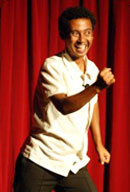It Sounds Better in Amharic

In his one-man play, It Sounds Better in Amharic, the Ethiopian-born Israeli actor Yossi Vassa humorously contrasts life in the old world and the new, mulling over the differences between traditional and modern ways of dating and the respective virtues of traveling by donkey or Lamborghini. He also narrates his family's 400-mile journey from Ethiopia to Sudan—from where, in 1984, the Israeli air force flew 8,000 Ethiopian Jews to Israel. Vassa's family covered the 400 miles on foot, in three months. "Not to brag," he comments, "but it took the children of Israel 40 years."
Vassa's humor is deceptively sweet. Not only did his family walk the 400 miles, they had to travel at night in order to evade the bandits waiting to rob them blind. After making it to Sudan, they languished for nine months in subhuman conditions; others waited for up to two years, and 4,000 died, among them Vassa's two younger brothers and his grandmother. His story is far from unique.
Neither, in the end, is the story of the Ethiopian Jews, who form one of the latest chapters in the epic tale of Israel's ingathering of the exiles. Most of the diverse communities that have made their way to the promised land also suffered terribly along the road, and upon arrival faced difficulties comparable to those confronting the Ethiopians: the disparity between messianic expectations and prosaic reality, the gap between traditional and modern societies, the breakdown of family structure, the rigors of learning a new language and of being settled in peripheral communities. All this has been standard fare, especially for those coming from Asia and Africa.
Still, the Ethiopian experience has been particularly trying. Almost a third of this population is now native-born, knowing little if anything about its former homeland. Yet, in the eyes of Israeli society, these Hebrew-speaking Jews remain firmly "Ethiopian"; a recent study ranks them with Arabs and ultra-Orthodox Jews when it comes to difficulties encountered in finding employment.
In an open discussion with a Jerusalem audience after a recent performance, Vassa acknowledged the problem of discrimination but preferred to focus instead on the importance of raising the consciousness of his kinsmen. Ethiopian Jews, he said, tend to be unaware of the currents of cultural condescension within Israeli society. In his play he reads aloud from an advertisement promoting tourism to Africa: intrepid travelers are invited to pay top dollar for journeying deep into the bush and sleeping on a mat in a pristine village—"In other words, like I lived before I came to Israel." His point: Ethiopian Israelis need to understand that they bring something important to the national table.
His show is a case in point, and there are other examples as well. Abatte Barihun, half of the successful Ras Deshen Duo, combines Ethiopian music with jazz, blues, and Middle Eastern sounds. Rabbi Sharon Shalom, a communal leader and budding scholar, is writing a legal code in the light of Ethiopian Jewish tradition and experience. On the national level, the festival of Sigd, celebrated 50 days after Yom Kippur and marked in Ethiopia by ascending a mountain, facing Jerusalem, and reading from different books of the Bible has been declared an official state holiday, to be taught in all schools.
This is a tricky time for Israel's Ethiopian Jews. The economic and social challenges they face are real, and the response of Israeli society can sometimes leave much to be desired. But the greatest danger is that the Ethiopians themselves will adopt a passive attitude to their difficulties, an inclination too frequently reinforced by well-meaning supporters who speak of them only as objects of victimization. Fostering an activist spirit and cultivating Jewish pride were two fundamental elements of the Zionist revolution. A dose of such old-fashioned virtues would serve this unique community well—and so, on their part and on the part of others, would an expanded awareness of the radically diverse and manifold character of the Jewish people as a whole.
Comments are closed for this article.





Tepper inhabits his subject rather than only commenting on it. And the deeper he goes, the richer is his product and our understanding and enjoyment.
His accomplishment is especially to be admired in view of the applicable journalistic space limitation.